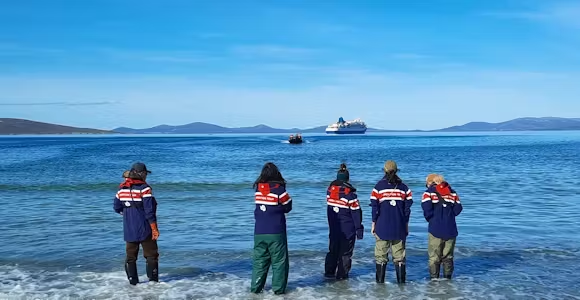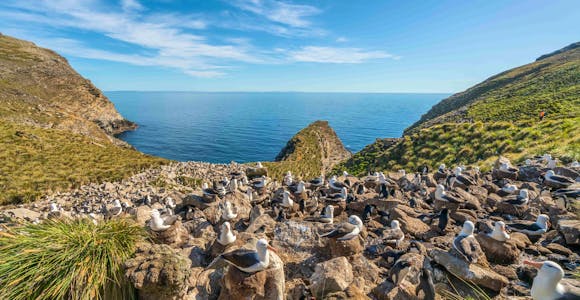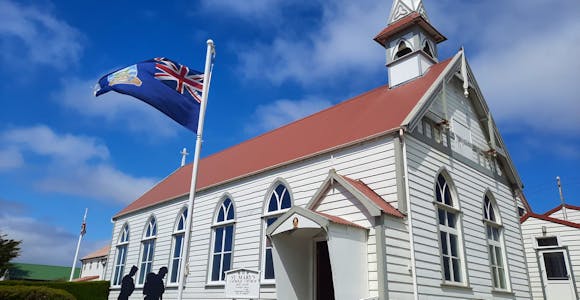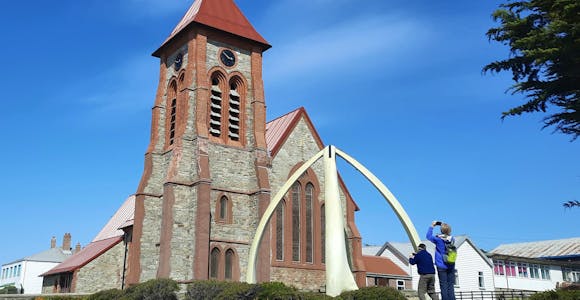
Getting to the Falkland Islands
Most people arrive in the Falkland Islands by expedition cruise ships but there are a small number of flight options for those looking for a fly-sail cruise.
Discover More
Gentoo penguins nesting on Saunders Island
A small number of expedition cruise ships visit the Falkland Islands in October, with South Georgia, before the Antarctic season gets going. This is the start of spring with gentoo, magellanic and rockhopper penguins all arriving to tend to their nests and mate. By the time November arrives there is a full complement of penguins to be seen and black-browed albatrosses are sitting on their nests. Upland geese will have already hatched their eggs to produce adorably fluffy goslings. Inland, listen out for songbirds in full voice, and plenty of buttery yellow flowers on the gorse bushes.
Daytime temperatures typically hover around 50–55ºF (10-13ºC), but as the days get longer, the warmth of the sun begins to edge the mercury higher.

Black-browed albatrosses on the nest at Saunders Island
December to January are the most popular months to visit the Falkland Islands, as these coincide with high season in Antarctica. The penguin colonies will be full to bursting with chicks (it’s worth remembering that due to their unusually long breeding cycle, you can see king penguin chicks throughout the year here). The new year also sees the arrival of the first sealion and fur seal pups. The chance of southern right whale sightings in Falkland Islands waters increases during these months.
Daytime temperatures average around 60ºF (15ºC), but when the sun is out and the wind drops you might reasonably expect temperatures up to the mid-70sºF (25ºC).

A rockhopper penguin undergoing its annual moult on Bleaker Island
March sees the close of the visitor season as it does for Antarctica and South Georgia. The days begin to shorten but there are still good wildlife experiences to be had. Penguin chicks are mostly fledging at this time and starting to investigate the sea, which is the cue for the adults to begin their own moult ahead of their return to sea where they’ll spend the winter. King penguins and a significant number of gentoos remain on the islands. Black-browed albatross chicks take rather longer to mature and can be seen on their nests waiting patiently for their parents to return with a meal.
Seal and sealion pups are also preparing to take to the sea – for the most part the adults have already taken to the waters.
Daytime temperatures are around 55ºF (10-12ºC), but colder wetter winds are constantly on the horizon to presage the arrival of the austral winter.
Price Match Promise - We’ll match any price you find elsewhere for the same trip

Most people arrive in the Falkland Islands by expedition cruise ships but there are a small number of flight options for those looking for a fly-sail cruise.
Discover More
The Falkland Islands are a great wildlife watching location and are home to both sub-Antarctic species and those from mainland South America.
Discover More
The human history of the Falklands Islands barely stretches back more than a handful of centuries, but these tiny islands have packed a lot into that time.
Discover More
The pocket-sized capital of the Falkland Islands is full of history and easily explored on foot by visitors from expedition cruise ships.
Discover MoreWe'll spend some time listening to your aspirations, then discuss the kind of experience that might suit you.
Next we'll discuss the options, shortlist the best trips for you and present you our impartial recommendations.
We'll place a 24 hour hold on your preferred option - without obligation - whilst we talk through the details.